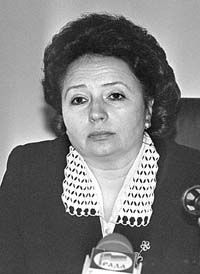At the first news conference after her reelection as Verkhovna Rada Human Rights Ombudsperson, Nina Karpachova was self-critical. She admitted to being dissatisfied with the progress made, saying it would be more relevant to speak of problems than achievements at the present stage. She also views her reelection as a powerful stimulus to work with increased effort.
Despite her self-criticism, the results of Nina Karpachova’s five years’ work are not nearly as modest as her words seem to indicate, with 30% of the 304,000 complaints received by the ombudsperson resolved in favor of the complainant. Incidentally, this figure exceeds the corresponding international indices. Meanwhile, a US Department of State report on Ukraine cites the active work of the human rights ombudsperson among the positive aspects of Ukraine’s legal policy. However, Ms. Karpachova does not claim credit for this. She finds it more important to remain politically neutral.
One can say with certainty that the institution of ombudsperson has been finally established in Ukraine. To illustrate, in the first two years the ombudsperson had neither an office of her own, nor funding, and the powers that be, according to Ms. Karpachova, ignored her appeals in most cases: “I remember we sent our first annual report to one of the governors. His reply baffled us: ‘We have studied the report. It sounds interesting. But protection of human rights is not the province of the executive power’.” This time around, Ms. Karpachova said proudly, days after she presented her annual report to the parliament, Pres. Kuchma signed a number of decrees, and Premier Yanukovych issued instructions concerning the observation of Ukrainian migrants’ rights abroad.
Now the ombudsperson faces new challenges. She has plans to open regional offices of human rights ombudsmen throughout Ukraine. According to Ms. Karpachova, the fact that they will receive complaints in the regions does not mean that they will not reach the central office. A broader network of offices will help achieve more tangible results. Moreover, Ms. Karpachova is discussing with the relevant parliamentary committee the possibility of appointing ombudsmen specializing in the issues of the freedom of expression, military law, and children’s rights.
As for children’s rights, Ms. Karpachova’s plans are unprecedented, for she expects children to protect their own rights. After they have undergone special training, sixteen- and seventeen-year-old ombudsmen will be assigned to each regional office to collect information about violations of minors’ rights and report them to the central office of the ombudsperson and local governments. Ms. Karpachova decided on such a move after the results of the monitoring by her office conducted jointly with the World Labor Organization were released revealing a figure of 700,000 underage children exploited in Ukraine almost like slaves.
Moreover, the ombudsperson plans to insist that medical establishments of the Internal Affairs Ministry and the Corrections Department be subordinated to the Health Ministry, for presently “Ukrainians are unable to prove they have been tortured by representatives of the law enforcement.” Simultaneously, Ms. Karpachova vows to press for the introduction of international standards for pretrial detention in Ukraine. While internationally, suspects may not be kept in pretrial detention cells for more than two days, in Ukraine they can be held up to 72 hours. With the huge number of cases pending trial, detention periods tend to grow even longer. For example, according to Ms. Karpachova, some courts in the Donetsk oblast have a waiting list of cases from 1999 and 2000 still pending trial. Thus, while in the West the executive and law enforcement agencies bear primary responsibility for human rights violations, in Ukraine this list also includes courts. A third of all reported cases of civil rights violations (which account for one half of all complaints investigated by the ombudsperson) deal with failures to observe court decisions as well as delays in investigation.







